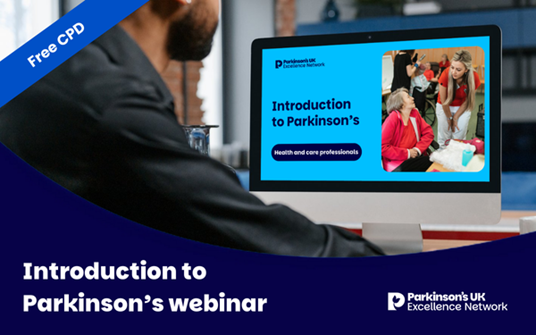
Parkinson’s is a progressive neurological disorder that affects movement, muscle control and balance.
People living with Parkinson’s often face daily challenges, such as tremors, stiffness and slowness of movement, which can significantly impact their quality of life. Beyond the physical symptoms, many also experience anxiety and depression, adding emotional hurdles to their journey. There are over 40 symptoms of Parkinson’s and everyone’s experience is different.
Education of professionals plays a pivotal role in managing Parkinson’s effectively. By staying informed about the latest research, treatments and coping strategies, health and social care staff can make empowered decisions about care plans and lifestyle adjustments. Knowledge about the condition fosters a proactive approach, enabling individuals to anticipate challenges and implement effective solutions.
Community support is equally vital. Engaging with support groups, therapeutic programmes and educational workshops provides a platform for sharing experiences, gaining emotional support and learning from others facing similar challenges
In essence, the combination of continuous education and robust community support forms the cornerstone of effective Parkinson’s management, empowering individuals to lead fulfilling lives despite the condition.
Working together to improve life with Parkinson’s
Parkinson’s UK supports every Parkinson’s journey, every step of the way.
The Parkinson’s UK Excellence Network helps health and social care professionals provide better support for people with Parkinson’s across the UK.
We offer opportunities for collaboration, service improvement and education, including free tools, courses and data to support professional development and improve patient care.
We work together to improve life with Parkinson’s
About the Volunteer-Led Education Programme
Presented via the Excellence Network, the Volunteer-Led Education Programme aims to enhance the knowledge and understanding of Parkinson’s among health and social care staff working in various settings, including care homes, nursing homes and home care environments. The primary objectives of the learning are:
- Enhancing medication management: the programme educates staff on the critical importance of administering Parkinson’s medication precisely as prescribed, rather than aligning doses with standard drug rounds, as even short delays to Parkinson’s medication can worsen symptoms. Timely medication ensures individuals can maintain greater independence, thereby reducing the caregiving burden and freeing up staff time.
- Recognising individual needs: we train carers to understand the needs of those living with Parkinson’s. This includes allowing individuals ample time to focus on tasks like walking to the toilet without unnecessary conversation, encouraging the use of chairs with arms to aid mobility when standing from a seated position, and providing sufficient time for individuals to process questions and respond, acknowledging the slower processing speeds associated with the condition.
- Understanding condition fluctuations: the training highlights that Parkinson’s symptoms can vary from hour to hour. Care staff are trained to recognise these fluctuations, understanding that abilities can change daily, and that individuals are not being unco-operative but are facing genuine challenges.
The overarching goal is to foster reflective practice among care staff, leading to improved care strategies and quality of life for individuals with Parkinson’s.
Ongoing support for learners
Participants in the learning engage in a one-hour virtual training session scheduled at their convenience. Upon completion, attendees receive:
- A Parkinson’s UK Excellence Network Certificate: this serves as a testament to their commitment and can be utilised for continuing professional development (CPD) purposes.
- A My Parkinson’s Workbook: a comprehensive resource offering further information to reinforce learning and support ongoing education.
- Continuous support, with access to advanced free training through the Parkinson’s Learning Hub.
Feedback from professionals
To date, the Volunteer-Led Education Programme has trained over 9,000 health and social care staff across the UK.
Feedback from participants has been overwhelmingly positive, showing significant improvements in care practices. One carer noted:
“It has given me a greater awareness of how Parkinson’s impacts the person both mentally and physically, and I aim to adjust my practice to take this into account by giving more time for people we support to talk and for me to listen carefully and pick up on cues.”
Another participant shared:
“I feel I am much more aware of the importance of receiving medication at the correct time. I now understand that not receiving medication on time can really impact someone and prevent them from being able to communicate properly or can affect their symptoms negatively. I feel I know more about symptoms and strategies to use and will look at activities that may help alleviate symptoms, such as physical activity, if the person is able. I am also now aware of the Parkinson’s UK Excellence Network’s ongoing support and will sign up to their newsletter. This will be a good way to learn more about the condition.”
Transforming care through volunteer-led education
Recently, a care group operating nine care homes sought to enhance the quality of care for their 30 residents living with Parkinson’s.
They enrolled 200 of their care staff on to the ‘Introduction to Parkinson’s’ education programme to deepen their understanding of the condition and improve patient outcomes.
Resident A’s journey:
Among the residents, one individual faced significant challenges:
- Anxiety triggers: situations such as other residents finishing meals before her heightened her anxiety levels.
- Dietary concerns: a high risk of choking.
- Mobility issues: she was prone to falls and experienced considerable anxiety during movements and transfers.
Post-training, the care team introduced several targeted interventions:
- Customised care planning: they developed a specific care plan addressing the nuances of Parkinson’s.
- Speech and language therapy: after an assessment by a speech and language therapist, the resident was placed on a soft diet to lessen the risk of choking.
- Medication management: recognising the importance of giving Parkinson’s medication on time, alarms were set 15 minutes before each scheduled dose, with additional reminders at five-minute intervals.
These measures led to notable improvements:
- Symptom reduction: Resident A experienced decreased rigidity and tremors.
- Enhanced mobility: there was a significant reduction in falls.
- Emotional wellbeing: her levels of stress and anxiety diminished considerably.
Collectively, these outcomes contributed to a reduced risk profile and a marked improvement in Resident A’s quality of life.
Equipping care staff
The positive changes observed by this resident reflect the broader benefits of the Volunteer-Led Education Programme.
By equipping care staff with specialised knowledge and practical strategies, the programme provides a more supportive and effective care environment for all residents living with Parkinson’s.
Essential knowledge to improve Parkinson’s care
Learn more on how you can improve care for people with Parkinson’s by participating in our free, one-hour Introduction to Parkinson’s webinar.
This session is tailored for health and care professionals, providing essential knowledge to improve patient outcomes and promote independence.
By attending, you’ll gain insights into timely medication management, effective communication strategies and techniques to support daily activities, empowering those in your care to lead more autonomous lives.
Learn more about our Parkinson’s UK Excellence Network and how you can get involved on our website.
Together, we’ll make the biggest positive difference to the lives of everybody living with Parkinson’s.


